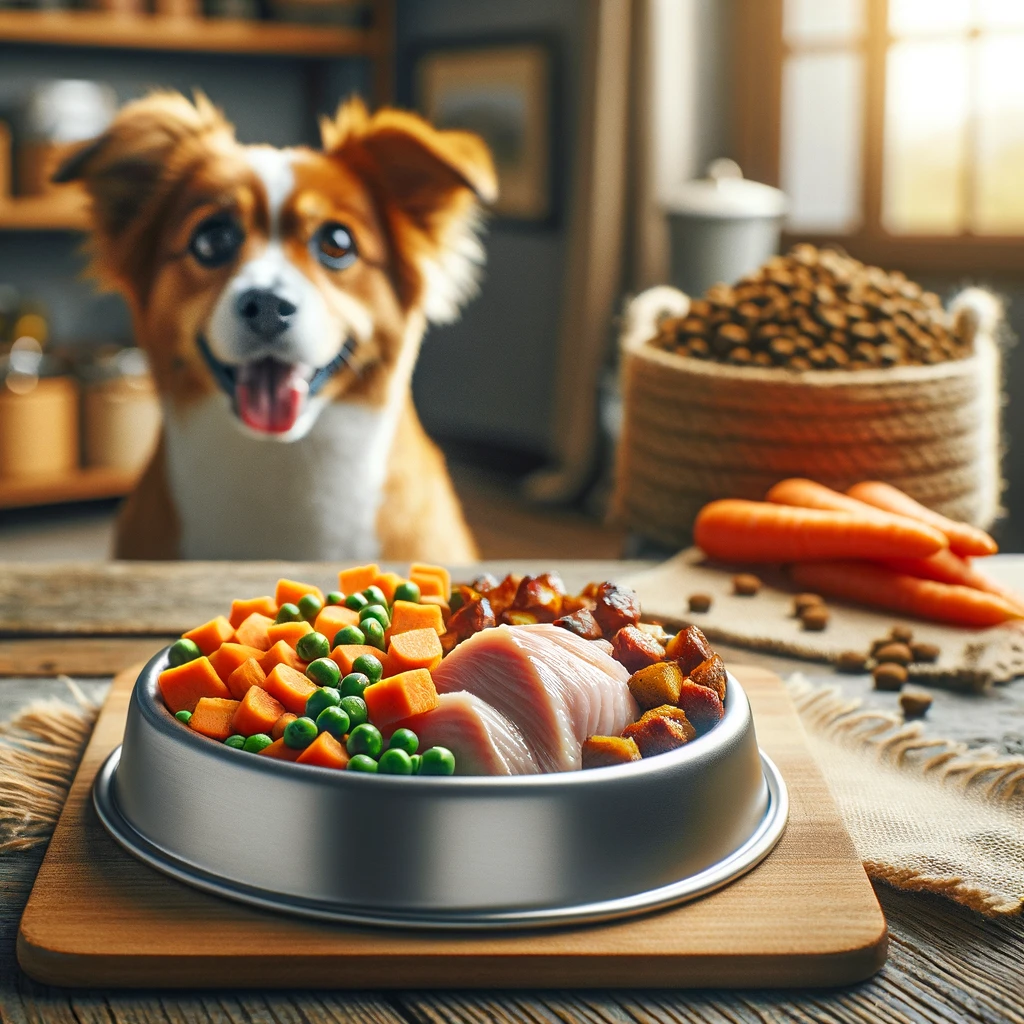Are you looking for a nutritious and delicious meal for your small dog? Look no further! This homemade dog food chicken recipe for small dogs is specially crafted to meet the specific nutritional needs and common health concerns of small breeds. With the perfect balance of protein, carbohydrates, and fats, this recipe ensures your furry friend gets all the essential nutrients for a healthy and happy life.
Our recipe features lean chicken, sweet potatoes, carrots, and green peas, combined with the beneficial fats from flaxseed oil. Each ingredient is chosen to support the overall well-being of small dogs. Chicken provides high-quality protein, while sweet potatoes and carrots offer easily digestible carbohydrates and vital vitamins. Green peas add a touch of fiber and extra protein, and flaxseed oil contributes essential fatty acids for a shiny coat and healthy skin.
Preparing homemade meals for your dog allows you to control the quality and freshness of the ingredients. This homemade dog food chicken recipe for small dogs is straightforward to make and can be adjusted to cater to special dietary needs. For dogs with allergies, sensitive stomachs, diabetes, or arthritis, we provide alternatives to ensure every pup can enjoy this meal.
By taking the time to prepare homemade dog food, you’re not only providing superior nutrition but also showing love and care for your pet. This recipe is designed with portion control in mind, making it easy to serve the right amount based on your dog’s weight.
Equip yourself with more knowledge to enhance your pet’s diet by checking out our free report on 9 Super Foods For Superior Canine Health. This valuable resource provides insights into superfoods that can further improve your dog’s nutrition. Don’t miss out on this opportunity – click here now to access the free report and ensure your dog’s diet is the best it can be.
Homemade Dog Food Chicken Recipe With Sweet Potatoes for Small Dogs
Ingredients:
- 12 oz lean chicken, chopped (60% protein)
- 4 oz sweet potatoes, cooked and mashed (20% carbs)
- 2 oz carrots, cooked and diced (10% carbs)
- 2 oz green peas (10% carbs and protein)
- 1 tbsp flaxseed oil (fat)
Instructions:
- Prepare Ingredients:
- Chop the chicken into small pieces.
- Cook and mash the sweet potatoes.
- Dice the cooked carrots.
- Measure the green peas.
- Cooking the Chicken:
- In a large skillet, cook the chopped chicken over medium heat until fully cooked and no longer pink inside. This should take about 10-12 minutes. Ensure the chicken is well-cooked to prevent any risk of foodborne illness.
- Combining Ingredients:
- In a large mixing bowl, combine the cooked chicken, mashed sweet potatoes, diced carrots, and green peas.
- Add the flaxseed oil and mix thoroughly to ensure all ingredients are evenly distributed.
- Serving:
- Allow the mixture to cool completely before serving to your dog.
- Store any leftovers in an airtight container in the refrigerator for up to 3 days or freeze portions for up to 3 months.
Alternatives for Special Considerations:
- Allergies: If your dog is allergic to chicken, you can substitute it with turkey or lean beef.
- Sensitive Stomachs: Use easily digestible vegetables like pumpkin instead of peas.
- Diabetes: Replace sweet potatoes with low-glycemic vegetables like broccoli or zucchini.
- Arthritis: Include anti-inflammatory ingredients like turmeric or fish oil.
Serving Size Guidelines:
- 10-12lb. dog: 1/4lb. or 1/2 cup per day
- 20-25lb. dog: 1/2lb. or 1 cup per day
- 40-50lb. dog: 1lb. or 2 cups per day
- 100lb. dog: 2lbs. or 4 cups per day
Macronutrient Composition:
- Protein: 60%
- Carbs: 20%
- Fats: 20%
This recipe is designed to meet the nutritional needs of small dogs, ensuring they receive a balanced diet with the right proportions of protein, carbohydrates, and fats. Adjust serving sizes according to your dog’s specific weight and activity level, and consult with your veterinarian to ensure it meets your dog’s dietary needs.


